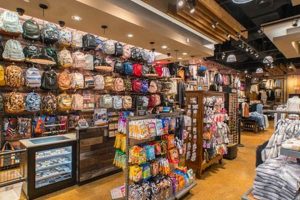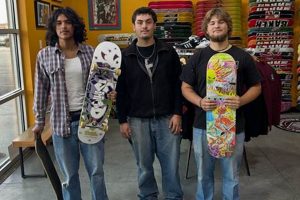Businesses specializing in the sale of skateboarding equipment, apparel, and related accessories located within the geographical boundaries of a major Midwestern metropolis. These establishments cater to a diverse clientele, ranging from novice riders seeking their first board to experienced skaters requiring specialized components for high-performance maneuvers.
The presence of these retail outlets supports the local skateboarding community by providing access to essential resources and fostering a sense of belonging. They often serve as gathering places for skaters to connect, share knowledge, and learn from one another. Historically, these stores have played a vital role in the evolution of skateboarding culture, promoting innovation in board design and influencing trends in skateboarding style.
The subsequent sections will delve into the specific types of merchandise offered, notable establishments within the city, and the impact these businesses have on the broader urban landscape.
The following recommendations are designed to aid individuals in making informed decisions when selecting a purveyor of skateboarding goods within an urban environment.
Tip 1: Prioritize Expertise. Seek establishments staffed by individuals with demonstrable knowledge of skateboarding equipment and techniques. An informed staff can provide valuable insights regarding board selection, component compatibility, and maintenance procedures.
Tip 2: Evaluate Inventory Diversity. Opt for locations offering a wide range of products, catering to various skill levels and skateboarding disciplines (e.g., street, park, vert). A diverse inventory indicates a commitment to serving a broad customer base.
Tip 3: Assess Product Quality. Investigate the brands carried by the retailer. Reputable brands generally adhere to higher standards of material quality and manufacturing processes, resulting in increased durability and performance.
Tip 4: Inquire About Customization Options. Determine if the store offers services such as deck mounting, grip tape application, or custom board builds. These services can enhance the overall skateboarding experience by ensuring optimal equipment setup.
Tip 5: Consider Location and Accessibility. Choose a shop that is conveniently located and easily accessible via public transportation or personal vehicle. Proximity can facilitate regular visits for maintenance, upgrades, or new purchases.
Tip 6: Review Customer Feedback. Consult online reviews and testimonials to gauge the reputation and customer service quality of the establishment. A positive track record suggests a reliable and customer-focused business.
Tip 7: Inquire About Return Policies. Clarify the store’s policies regarding returns and exchanges, particularly for equipment that may exhibit defects or fail to meet expectations. A clear return policy provides assurance in the event of unforeseen issues.
Adhering to these guidelines can significantly improve the selection process and ensure that skateboarders are equipped with the appropriate gear for their specific needs and skill levels.
The subsequent sections will delve into notable establishments and the impacts they have on the area skateboarding community.
1. Equipment Availability
The presence of retail outlets within a major Midwestern metropolis directly influences the accessibility of skateboarding equipment for the local population. Equipment availability, encompassing a range of skateboards, components, protective gear, and related accessories, is a critical determinant of participation in the sport. These establishments ensure that individuals have ready access to the necessary tools to engage in skateboarding, fostering its growth and development.
The absence of sufficient retail outlets negatively impacts the skateboarding community. Scarcity of equipment can lead to higher prices, limited selection, and increased barriers to entry, especially for beginners. By contrast, a well-established network of such shops contributes to a competitive market, promoting affordability and diverse product offerings. For example, consider the impact on a young skater who is unable to find a properly sized helmet. Such a scenario not only removes a potential customer, but limits the skater’s ability to safely partake in the sport.
Ultimately, the concentration of skate shops directly impacts a city’s accessibility and affordability of skateboarding related equipment. This relationship underpins the health and vibrancy of the local skateboarding scene. An understanding of this connection aids both consumers and aspiring entrepreneurs in navigating and contributing to the skateboarding community within this urban area.
2. Community Engagement
The relationship between retail establishments catering to skateboarders and community engagement represents a symbiotic dynamic. The presence of these shops extends beyond mere commercial transactions; they serve as catalysts for social interaction, skill development, and the propagation of skateboarding culture within a major metropolitan area.
- Sponsorship of Local Events
Retailers often provide financial or material support for local skateboarding events, such as competitions, demonstrations, and workshops. This sponsorship fosters a sense of community pride and provides opportunities for skaters of all skill levels to showcase their abilities. A local skateboard shop might donate prizes, or offer support by having staff run various aspects of a local competition.
- Organization of Group Activities
Many establishments organize group skate sessions, clinics, and other activities designed to connect skaters and promote skill sharing. These events create a supportive environment for both experienced and novice skateboarders, fostering a sense of camaraderie and encouraging participation in the sport. For example, a skate shop might offer lessons on skateboard repair.
- Provision of a Physical Gathering Space
Skate shops frequently function as informal gathering places for skateboarders to meet, socialize, and exchange information. This physical space fosters a sense of belonging and provides a platform for building relationships within the skateboarding community. Such community centers are invaluable to the health of skateboarding.
- Advocacy for Local Skateboarding Infrastructure
Certain retail establishments actively advocate for the development and maintenance of local skateboarding infrastructure, such as skate parks and street skating areas. By supporting these initiatives, they contribute to the long-term sustainability of the skateboarding community and provide access to safe and well-maintained skating environments. Some shops may be active in the politics of the city to advocate for such spaces.
The aforementioned facets illustrate the multifaceted role of skateboarding retail locations in nurturing and sustaining the skateboarding community. By actively engaging in these activities, establishments not only strengthen their customer base but also contribute to the overall health and vibrancy of the skateboarding culture within the urban landscape.
3. Location Accessibility
The ease with which individuals can reach establishments is a critical factor influencing the success and community impact. In an urban environment, proximity to public transportation, availability of parking, and walkability significantly affect customer traffic and, consequently, a shop’s ability to serve the local skateboarding community. A location poorly served by public transit or lacking adequate parking may deter potential customers, particularly those traveling from outlying areas or carrying bulky equipment. Conversely, a shop situated near a transit hub or with ample parking access enhances its appeal and expands its potential customer base.
Consider, for example, a skate shop located in close proximity to a train station and several bus lines. This strategic placement facilitates access for a wider range of individuals, including students, commuters, and residents from various neighborhoods. Such accessibility can translate into increased foot traffic, higher sales volume, and greater opportunities for community engagement. In contrast, a shop situated in an industrial area with limited public transport options and restricted parking may struggle to attract customers despite offering high-quality products or services. The shop must be near main roads, or provide easily accessible alternative means to gain customers.
Ultimately, location accessibility represents a crucial determinant of a skate shop’s viability and its ability to foster a thriving skateboarding culture. Recognizing this interrelationship allows business owners and community stakeholders to make informed decisions regarding site selection, infrastructure improvements, and transportation planning, thereby maximizing the positive impact of these establishments on the urban landscape.
4. Expertise of Staff
The proficiency of personnel within skateboarding retail establishments directly influences customer satisfaction, safety, and the overall vibrancy of the Chicago skateboarding community. Staff possessing comprehensive knowledge of skateboarding equipment, techniques, and safety protocols serve as invaluable resources for customers of all skill levels. This expertise facilitates informed purchasing decisions, proper equipment maintenance, and effective skill development, all of which contribute to a positive and safe skateboarding experience. For example, a staff member skilled in board assembly and customization can ensure that a customer’s skateboard is properly configured for their specific riding style and physical attributes, reducing the risk of injury and enhancing performance.
The absence of knowledgeable staff can have detrimental consequences. Misinformed advice may lead to the purchase of unsuitable equipment, increasing the likelihood of accidents and discouraging participation in the sport. Furthermore, a lack of expertise can hinder the transmission of essential skateboarding knowledge and cultural values, potentially undermining the long-term sustainability of the community. Consider a novice skateboarder receiving incorrect advice on helmet sizing; this oversight could result in inadequate protection and increase the risk of head injuries. Conversely, a shop with experts actively engaged in the community, could offer instruction to novices, teach maintenance and repair to advanced skaters, and help customers pick the right component. This can promote safer, longer lasting skating, resulting in more satisfaction among local residents. These retailers further contribute to the knowledge base of the city’s skating culture.
In summation, the expertise of staff within Chicago-based skateboarding shops is a crucial determinant of customer well-being and the health of the skateboarding community. Prioritizing staff training, industry certifications, and active engagement within the skateboarding scene is essential for ensuring that these establishments provide valuable services, promote safe practices, and contribute to the continued growth and development of skateboarding in the city.
5. Brand Diversity
The availability of a wide selection of manufacturers’ products within Chicago’s skateboarding retail sector is a key indicator of market maturity and consumer choice. Brand diversity directly affects the consumer’s ability to select equipment tailored to individual preferences, skill levels, and skateboarding styles. A skate shop stocking only a limited number of brands restricts consumer choice and may fail to meet the specific needs of all skateboarders. Conversely, retailers offering a wide array of brands cater to a broader spectrum of skaters, fostering a more inclusive and vibrant skateboarding community. The presence of both established and emerging brands fosters competition and innovation within the industry, ultimately benefiting consumers through improved product quality and competitive pricing. For instance, a shop stocking both larger brands and the smaller, independent brands would likely foster more creativity within the local skating culture.
The causes of brand diversity within Chicago’s skate shops are multifactorial, encompassing economic trends, consumer demand, and the retailer’s strategic decisions. Shops that actively seek out new and emerging brands demonstrate a commitment to innovation and catering to evolving consumer preferences. This proactive approach often involves attending industry trade shows, building relationships with independent manufacturers, and engaging with the local skateboarding community to identify unmet needs. The effect of this diversity is significant, allowing skaters to find equipment that aligns perfectly with their individual styles and skill levels, thus improving performance and overall satisfaction. For example, certain niche brands specializing in custom decks or particular truck designs can only be found in shops that prioritize brand diversity.
In conclusion, brand diversity within establishments is not merely a matter of inventory management but a fundamental aspect of fostering a thriving skateboarding ecosystem. By providing consumers with a wide range of choices, these shops contribute to individual expression, community engagement, and the long-term sustainability of skateboarding in the city. Challenges remain in balancing the demand for established brands with the need to support emerging manufacturers, requiring retailers to carefully curate their inventory and engage in effective marketing strategies to promote the unique qualities of each brand they carry.
Frequently Asked Questions Regarding Skate Shops in Chicago
The following addresses prevalent inquiries concerning establishments that vend skateboarding equipment and related accessories within the specified urban area.
Question 1: What is the typical price range for a complete skateboard from a Chicago-area skate shop?
The cost of a complete skateboard varies significantly based on component quality, brand, and customization. Expect to pay between $100 and $300 for a decent quality complete setup. Higher-end, customized boards can exceed $400.
Question 2: Do Chicago skate shops typically offer repair services?
Many, but not all, retail locations provide repair services. These services commonly include bearing replacement, grip tape application, truck mounting, and wheel changes. Inquire directly with individual shops regarding service availability and pricing.
Question 3: Are there skate shops in Chicago that cater specifically to beginner skateboarders?
While most establishments welcome beginners, some may offer specialized services such as introductory lessons or beginner-friendly equipment packages. It is advisable to contact individual shops to ascertain their level of support for novice skateboarders.
Question 4: How can one verify the authenticity of skateboarding equipment purchased from a Chicago retailer?
Purchase equipment from reputable establishments known for carrying authentic products from established brands. Examine the product for quality craftsmanship, official logos, and proper packaging. When in doubt, consult with experienced skateboarders or online resources to verify authenticity.
Question 5: Do skate shops in Chicago typically offer a warranty on their products?
Warranty policies vary significantly between manufacturers and retailers. Some products may be covered by a manufacturer’s warranty, while others may be subject to the shop’s return or exchange policy. Review the terms and conditions of sale before making a purchase.
Question 6: Are there any skate shops in Chicago that actively support the local skateboarding community?
Certain establishments actively contribute to the local skateboarding community through sponsorships, event organization, and advocacy for skate park development. Research individual shops to determine their level of community involvement.
This information serves to clarify common concerns regarding the procurement of skateboarding equipment and related services within the city. Prudent research and careful consideration of individual needs remain paramount.
The concluding section will synthesize the preceding information, providing a comprehensive overview of establishments.
Skate Shops in Chicago
This analysis has explored the multi-faceted role that retail establishments play within the context of skateboarding culture in a major Midwestern metropolis. The examination encompassed key aspects such as equipment availability, community engagement, location accessibility, staff expertise, and brand diversity. Each of these elements contributes significantly to the viability and impact of these businesses. The presence of well-stocked, accessible, and knowledgeable shops fosters a thriving environment for skateboarders of all skill levels, while also supporting the broader urban landscape.
Understanding the interconnectedness of these factors allows for informed decision-making by consumers, entrepreneurs, and community stakeholders. Continued investment in accessible locations, knowledgeable staff, and diverse product offerings will be critical to ensuring the long-term health and vibrancy of skateboarding culture. The sustained success of these businesses hinges on their ability to adapt to evolving consumer needs and to actively contribute to the local community’s social and recreational fabric, furthering skateboarding in Chicago for years to come.







